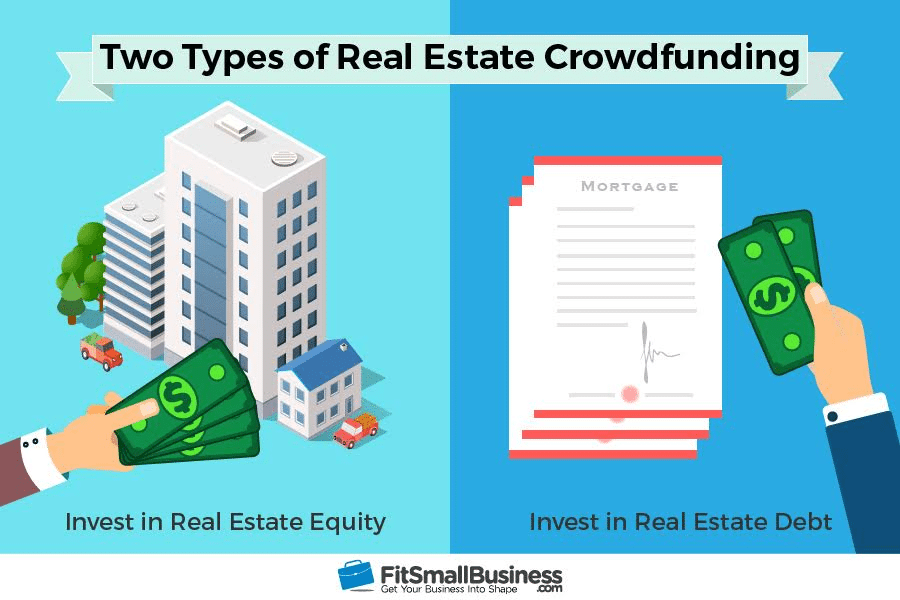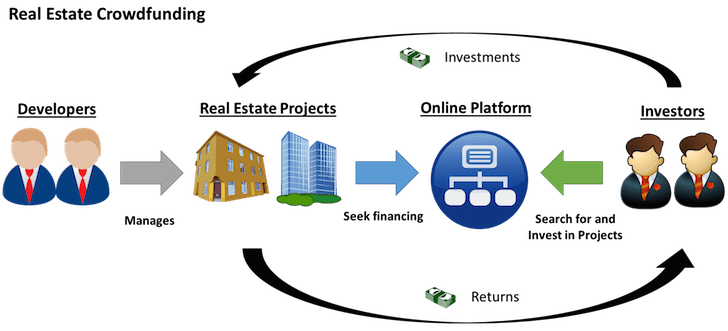Property Crowdfunding: Unlocking Real Estate Investment Opportunities for Everyone
Real estate has long been a popular investment vehicle, known for its ability to provide both capital appreciation and passive income. However, traditional real estate investments typically require significant upfront capital, making them inaccessible for many potential investors. This is where property crowdfunding steps in, offering a more inclusive way for individuals to invest in real estate projects without needing large amounts of money. In this article, we’ll explore property crowdfunding, how it works, its benefits, risks, and everything else you need to know to start investing.

What is Property Crowdfunding?
Property crowdfunding refers to the pooling of money from multiple investors to fund real estate projects, such as residential or commercial developments. Through online platforms, investors can contribute smaller amounts of money to fund large-scale real estate ventures, in return for potential profits based on the project’s success. This allows individuals to get involved in real estate without the need to purchase an entire property or manage it themselves.
In essence, property crowdfunding democratizes real estate investing, providing access to individuals who may have previously been excluded due to high entry costs.
How Does Property Crowdfunding Work?
The process of property crowdfunding can be broken down into several key steps:
- Choosing a Crowdfunding Platform: Investors start by selecting a real estate crowdfunding platform. These platforms act as intermediaries between developers and investors.
- Project Selection: Developers list their projects on these platforms, providing detailed information about the properties, expected returns, and timelines. Investors can browse through these options and choose the projects that interest them.
- Pooling Investments: Once a project is selected, multiple investors contribute varying amounts of capital to fund the project. The collective pool of funds is then used to purchase, develop, or renovate properties.
- Revenue Generation: As the property project generates income (through rents or property sales), investors receive returns proportional to their investment.
- Exit Strategy: Once the project is completed or reaches a profitable milestone, investors can either sell their shares or wait for the property to be sold, at which point they receive a share of the profits.

Types of Property Crowdfunding
There are several types of property crowdfunding, each with its unique features and investment structures. The two most common types are:
1. Equity Crowdfunding
In equity crowdfunding, investors pool their money to purchase shares in a real estate project. As an equity investor, you gain partial ownership of the property. Your return on investment (ROI) is generated from the capital appreciation of the property and any rental income. Equity investors are typically entitled to a portion of the profits when the property is sold or refinanced.
- Example: If you invest $10,000 in an apartment complex through an equity crowdfunding platform, you own a share of that property and earn a percentage of the rental income and the eventual profits from a sale.
2. Debt Crowdfunding
Debt crowdfunding is a more straightforward model in which investors lend money to a real estate developer, who in turn uses the funds to complete a project. In return, investors earn interest on their investment, similar to a traditional loan. Debt crowdfunding is often considered less risky than equity crowdfunding since the investor is typically paid back before the equity investors in the event of a liquidation.
- Example: You lend $10,000 to a developer for a commercial real estate project in exchange for a fixed interest rate over a set period of time.
Both models have their pros and cons, but both provide opportunities for investors to generate income from real estate projects.
Advantages of Property Crowdfunding
1. Low Minimum Investment
One of the most significant advantages of property crowdfunding is the low barrier to entry. Unlike traditional real estate investing, which may require hundreds of thousands of dollars to purchase a property, crowdfunding platforms allow individuals to invest as little as $500 to $5,000, depending on the platform.
2. Diversification
Property crowdfunding provides a unique opportunity to diversify your investment portfolio by gaining exposure to real estate without having to buy or manage physical properties. Through crowdfunding, you can invest in multiple projects across various locations and property types, reducing the overall risk in your investment strategy.
3. Access to High-Quality Real Estate
Crowdfunding platforms typically list high-quality real estate projects that would be difficult for individual investors to access on their own. These projects are often managed by experienced developers, ensuring that the properties are well-chosen and the projects are professionally executed.
4. Passive Income
For those looking to earn passive income, property crowdfunding is a great option. Once your investment is made, you don’t need to manage the property or deal with tenants. The developers handle all aspects of the project, and investors receive their portion of the returns based on the project’s success.

Risks of Property Crowdfunding
While property crowdfunding offers many benefits, there are also inherent risks that investors should be aware of before committing their capital.
1. Market Risks
Real estate markets can be volatile, and economic conditions, interest rates, and demand for properties can impact the success of a project. If the real estate market underperforms, there could be delays in the project, lower-than-expected returns, or even a loss of capital.
2. Platform Risk
The platform you choose to invest through plays a crucial role in the success of your investment. If a crowdfunding platform goes out of business or fails to manage funds properly, you may lose your investment. It’s essential to research platforms carefully and choose those with a solid reputation and track record.
3. Project Delays or Failures
Despite thorough planning, property projects may face delays or cost overruns, which can impact the expected return on investment. In some cases, a project may fail altogether, leading to a loss of capital for investors. It’s crucial to evaluate each project’s risk profile before investing.
4. Liquidity Risks
Real estate investments, including those in crowdfunding, are generally illiquid. Unlike stocks or bonds, it can take time to sell your investment and realize a profit. If the project takes longer to complete or if the property is not sold quickly, investors may face extended periods of waiting to receive their returns.
How to Get Started with Property Crowdfunding
If you’re interested in property crowdfunding, here’s a step-by-step guide to help you get started:
- Research Crowdfunding Platforms:
There are many property crowdfunding platforms available, each with its own set of fees, minimum investment requirements, and project types. Some popular platforms include Fundrise, RealtyMogul, and CrowdStreet. Research each platform’s reputation, track record, and reviews from other investors. -
Review Projects:
Once you’ve selected a platform, browse through the available projects. Pay attention to the property type, location, expected return on investment, and the project timeline. Look for projects that align with your investment goals and risk tolerance. -
Diversify Your Investments:
To reduce risk, consider investing in multiple projects across different sectors (residential, commercial, etc.) and locations. This helps protect your portfolio from downturns in any one area. -
Monitor Your Investments:
Keep an eye on your investments by regularly checking the platform for updates on the progress of the projects you’ve invested in. Many platforms provide regular reports and performance metrics to keep investors informed.
FAQs About Property Crowdfunding
Q1: Is property crowdfunding a safe investment?
A1: Property crowdfunding can be a relatively safe investment when done carefully. However, like any investment, it carries risks, including market fluctuations, project delays, and platform failure. It’s important to diversify and research thoroughly before investing.
Q2: How much can I earn from property crowdfunding?
A2: Returns can vary depending on the type of project, location, and the platform you invest through. Generally, returns range from 5% to 12% annually, though some projects may offer higher or lower returns.
Q3: Do I need to be an accredited investor to invest in property crowdfunding?
A3: Many crowdfunding platforms allow non-accredited investors to participate, though some high-risk or private platforms may require accreditation. Always check the platform’s requirements before investing.
Q4: How do I get my money back from property crowdfunding?
A4: You can typically exit your investment by either selling your shares back to the platform or waiting until the project is completed and the property is sold. The specific exit strategy depends on the platform and the project.
Conclusion
Property crowdfunding offers a unique opportunity for individuals to invest in real estate with lower capital, minimal risk, and great flexibility. By pooling funds with other investors, you can access a wide range of real estate projects and earn passive income without the complexities of direct property ownership. As with any investment, it’s essential to conduct thorough research, understand the risks, and diversify your portfolio to maximize returns and reduce risk.
For more information, visit platforms such as Fundrise, [RealtyMogul](https://
www.realtymogul.com), and CrowdStreet.

